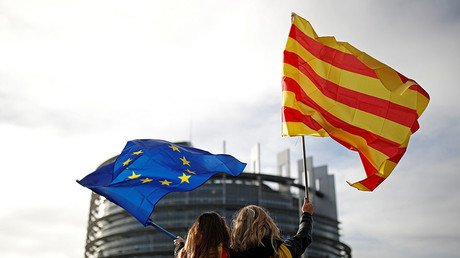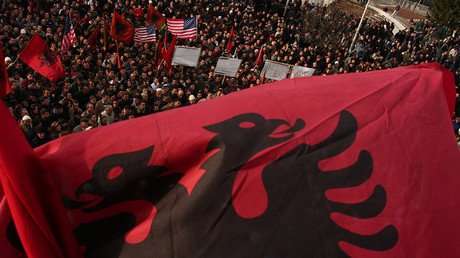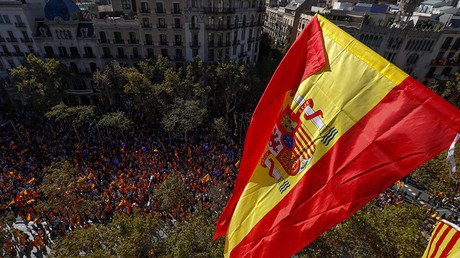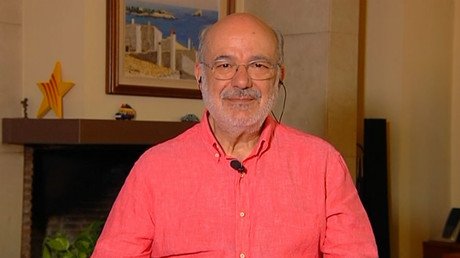West's double standards on Catalonia: Political justice OK for enemies, bad for friends
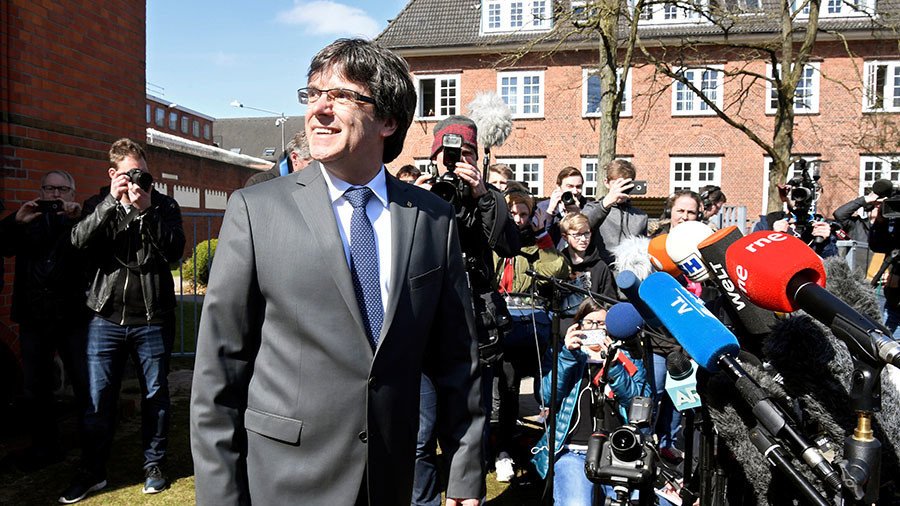
Many people have expressed shock at the fact that the Spanish authorities have imprisoned, or are trying to extradite, the leaders of the independence movement in Catalonia.
The same people, generally speaking, also attack Madrid for proclaiming the referendum held on October 1, 2017 to be illegal.
The legal tussles have taken on an international dimension ever since the former Catalan regional president, Carles Puigdemont, fled to Brussels and then to Germany, where he was arrested on March 25. Lawyers acting for Puigdemont's colleagues, such as Oriol Junqueras, the former vice president, have argued that these arrests and warrants are a political abuse of the legal process and a violation of international human rights.
Yet the same people, broadly speaking, were delighted when in 1998, the former Chilean president, General Augusto Pinochet, was arrested in London on an arrest warrant issued by a Spanish judge, Baltasar Garzon. Garzon was subsequently (in 2012) sacked as magistrate and barred from working as a judge for 11 years. At the time, his audacious warrant for the Chilean dictator was hailed as a breakthrough in international law, creating – his supporters claimed – a new universal jurisdiction which meant that the law could pursue suspects wherever they are.
In other words, people tend to support or oppose such international arrests depending on their feelings about the person accused. This is a double standard. Pinochet's enemies were so determined to see him stand trial, even in a foreign country (Spain) that they dismissed the argument that if he was to be tried anywhere, it should be in his home country. Yet Chile had decided, like other Latin American countries, including its neighbor, Argentina, to grant amnesty or immunity to its former dictators in the name of social peace. Judge Garzon was saying that Spain had the right to overturn this political decision and to upset the peace process in one of its former colonies.
Using similar logic, a German court has rejected Spain's attempt to prosecute the former Catalan president for sedition and rebellion, effectively striking down these parts of the European arrest warrant against him. A German judge is therefore ruling on what the law should be in Spain and on how Madrid should deal with the Catalan crisis.
Moreover, the German court ruled that sedition and rebellion do not exist in German law and that Germany can therefore not extradite Puigdemont for it. The judges seem to have forgotten that Article 9.2 of German Basic Law (the constitution) forbids anti-constitutional activity in exactly the same way as Article 544 of the Spanish penal code forbids sedition. Article 20 of German Basic Law even grants a totally undefined "right of resistance" to German citizens against anyone who attempts to subvert the constitution, as the Catalan independentists undoubtedly did last year.
Pushed to its most extreme logical conclusion, this article might mean that a German would have the right to shoot someone trying to change the German constitution in the way Puigdemont tried to change the Spanish constitution. But even without resorting to such an extreme hypothesis, the German judge must surely know that Spain experienced a bloodless coup attempt in 1981 and that its judiciary is therefore naturally jumpy about any new attempt to change the constitution through illegal acts, as happened in Barcelona last year.
If such statements seem shocking, it is because the doctrine of revolution has now become so popular, thanks in part to the color revolutions which have been engineered across Eastern Europe and the former Soviet Union since 1991, that it is assumed that all revolutionaries must be good. Such naiveté is based on ignorance of the fact that many revolutionaries are decidedly bad. Pinochet, like many military dictators in the Spanish-speaking world, led rebellions against the legal order and justified them in the name of a higher norm, like national salvation – just as the judges arresting Pinochet rebelled against the existing laws on state sovereignty and sovereign immunity in the name of universal jurisdiction and the interests of humanity.
Pinochet was the first former head of state to face international jurisdiction since the Nuremberg and Tokyo trials of 1945-1948. But his arrest consolidated a process which had started in 1993, with the creation of the International Criminal Tribunal for former Yugoslavia. This court went on to indict the incumbent president of Yugoslavia, Slobodan Milosevic, in May 1999, during the NATO bombing of his country.
Since then, the new tribunals of international "justice," lauded by so many would-be progressives as an antidote to dictatorship and fascism, have in reality marched in lockstep with the NATO powers and supported their wars by indicting the heads of enemy states. The most flagrant cases are the ones brought against Colonel Gaddafi by the International Criminal Court during the NATO bombing of Libya in 2011; against Laurent Gbagbo, president of Ivory Coast [Côte d'Ivoire], after French troops had captured him in Abidjan, also in 2011 and also by the ICC; and against Charles Taylor of Liberia whom the Americans were determined to remove once and for all from the politics of West Africa. Taylor was sent to Special Court for Sierra Leone sitting in The Hague in 2006 and he was sentenced, effectively for life, in 2012.
These proceedings launched against the enemies of the West by the West's tribunals have been models of injustice. They have discredited themselves in many ways but perhaps most of all by applying a version of conspiracy law, originally drafted to prosecute racketeering, to political events sometimes spanning decades. "Joint criminal enterprise," or JCE, has become the new magic bullet in the prosecutors' armory and is rightly caricatured as "just convict everyone" because its terms are almost infinitely flexible.
Yet Puigdemont, like all the West's favorite bad guys who have been arraigned in recent decades, is also accused of pursuing a "common plan" with a criminal purpose. In other words, national courts have started to adopt the worst practices of the new international kangaroo courts whose activities have done so much damage to basic legal principles.
What Puigdemont's supporters and Spain's opponents believe, of course, is that criminal law is being used to enforce political power of the Spanish state. This is quite true – but no less true is the fact that international tribunals, or national ones aiming to rule on international cases, also seek to enforce the will and the power of their respective states – legitimately or illegitimately, depending on your point of view. That legitimacy, however, is not a legal question because the law cannot answer it. It is, instead, a political one.
There is, however, a key difference between a national court and an international one. Whereas a national court may act badly or abusively, the state overall wields its power in the name of preserving social peace in the territory in question. This is what is called the social contract. If it fails to do so, there will be unrest. International courts, by contrast, are not part of any overarching structure which also guarantees peace: they do not have police forces or prisons; they do not have law-making powers or executives; and, crucially, their activity is not overseen by the state as a whole including its legislature. They never feel the consequences of their rulings because they are structurally detached from the peoples over whom they wield power. They are the very expression of power without responsibility.
So if people feel uneasy when they see Spain prosecuting Puigdemont and his colleagues for political crimes, they should also feel uneasy about the scores of cases of political "justice" applied by international tribunals which are, in reality, acting according to a political agenda. What is sauce for the goose is sauce for the gander.
The statements, views and opinions expressed in this column are solely those of the author and do not necessarily represent those of RT.

